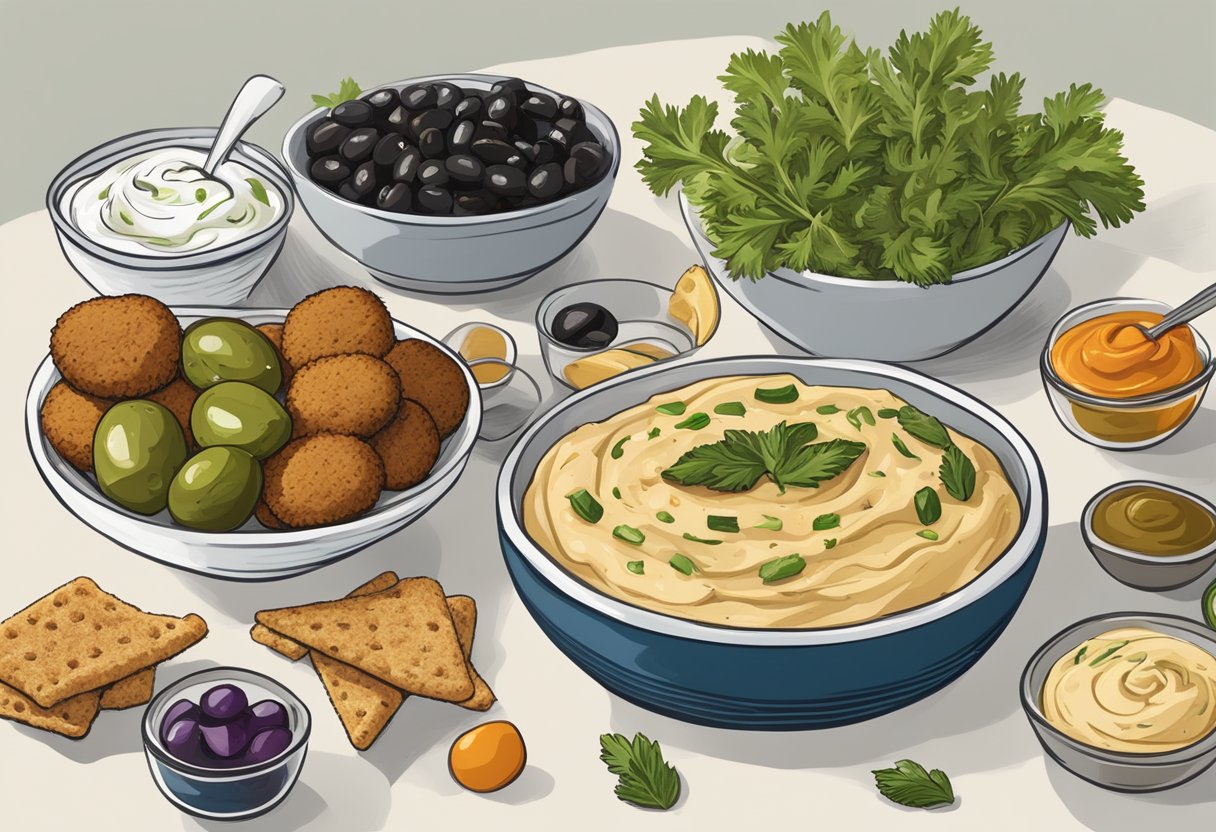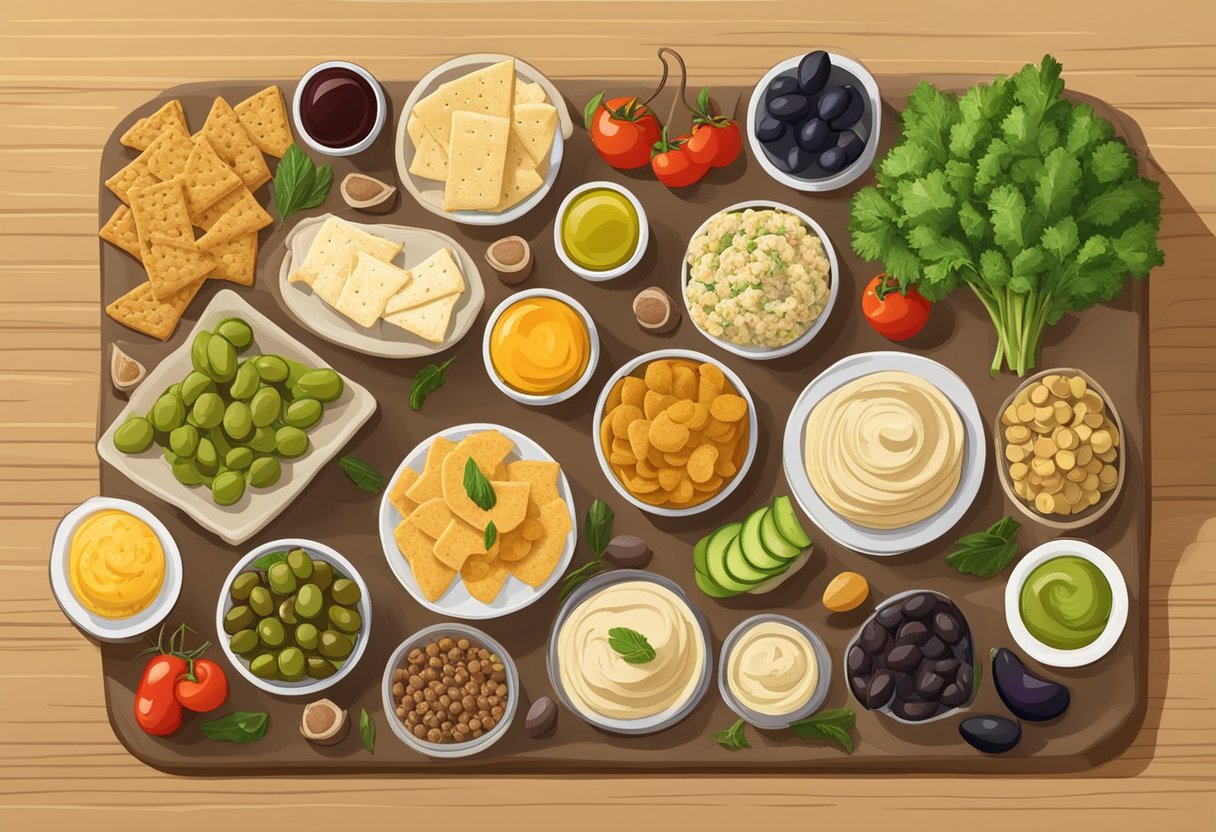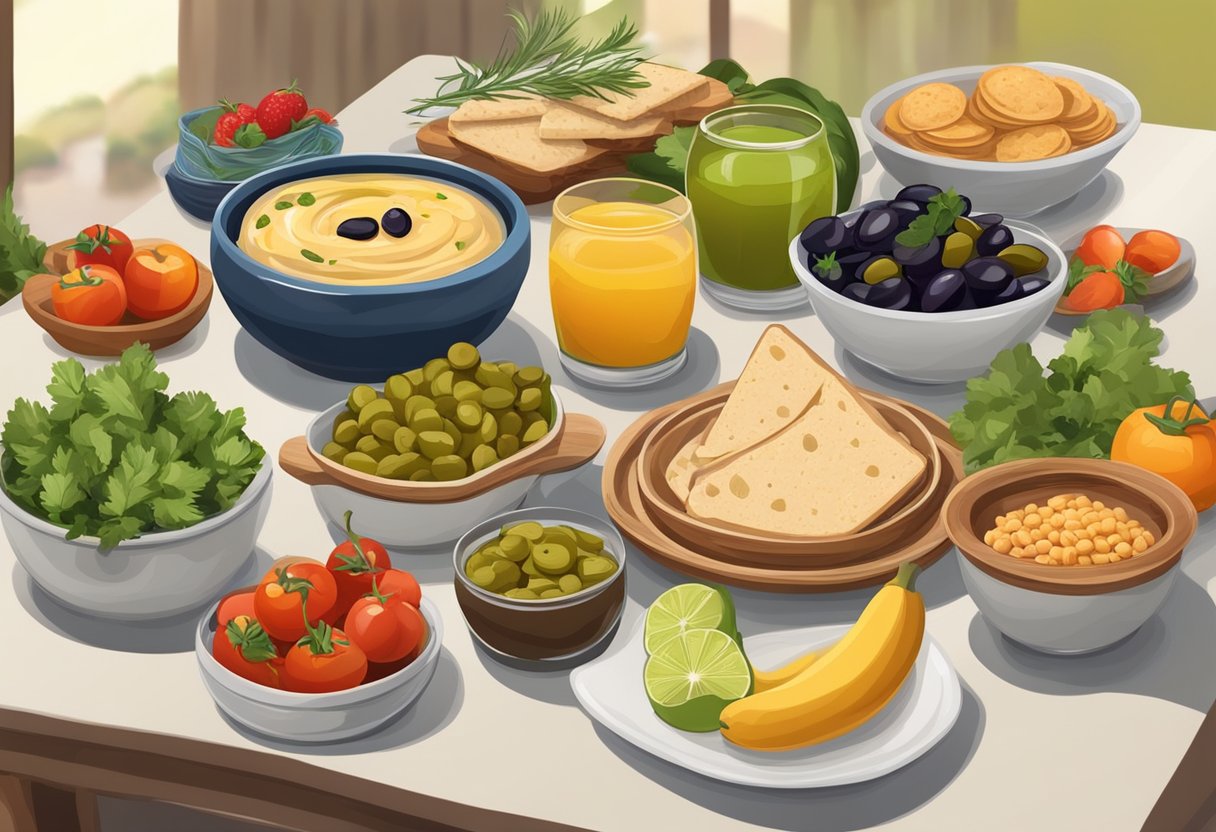Embracing a gluten-free lifestyle can be both a necessity for those with gluten sensitivities and a choice for individuals seeking a different approach to healthy eating. The Mediterranean diet, renowned for its health benefits and rich flavors, offers an array of gluten-free options that fit within this dietary preference. Combining the principles of both diets, gluten-free Mediterranean snacks provide nutritious alternatives that maintain the essence of traditional Mediterranean fare without the gluten.

The heart of gluten-free Mediterranean snacks lies in their ingredients—fresh vegetables, fruits, nuts, seeds, and lean proteins such as fish come together to create a variety of tasty and healthful options. These snacks are not only appealing to those with gluten sensitivities, but also to anyone exploring healthier snack alternatives. Olive oil, herbs, and spices play a central role in these snacks, offering the distinctive Mediterranean flavors while contributing to the overall nutritional profile of the dishes.
Key Takeaways
- Gluten-free Mediterranean snacks cater to those with gluten sensitivities while offering healthful benefits.
- Fresh produce, nuts, seeds, and lean proteins are central to gluten-free Mediterranean snack options.
- Key ingredients like olive oil, herbs, and spices infuse these snacks with authentic Mediterranean flavors.
Table of Contents
Understanding Gluten-Free Diet

In this section, one will explore the definition of gluten, the health benefits associated with a gluten-free lifestyle, the grains that fit this diet, and the medical conditions prompting gluten avoidance.
What Is Gluten
Gluten is a protein found predominantly in wheat, barley, and rye. It is responsible for the elasticity and chewiness in baked goods. When following a gluten-free diet, it’s essential to identify and eliminate foods containing these proteins.
Benefits of Gluten-Free Living
Embracing a gluten-free diet can lead to numerous health benefits, especially for individuals with gluten sensitivity or celiac disease. This diet can reduce symptoms like bloating, gas, and diarrhea, and can also promote gut health.
Common Gluten-Free Whole Grains
- Brown Rice: A naturally gluten-free whole grain often used in Mediterranean cooking for its nutty flavor and nutritional value.
- Buckwheat: Despite its name, it does not contain wheat and is a nutritious, gluten-free alternative.
- Quinoa: A seed that is prepared and eaten like a grain. It’s a staple in the gluten-free diet for its high protein content and versatility.
Gluten-free whole grains are cornerstone ingredients in the Mediterranean diet, allowing individuals to enjoy various nutritious meals without gluten.
Gluten Intolerance and Celiac Disease
Gluten intolerance and celiac disease are conditions that cause adverse reactions to gluten. Individuals with celiac disease must adhere to a strict gluten-free diet to avoid damage to the small intestine and maintain overall health.
Basics of Mediterranean Diet

The Mediterranean diet is an eating pattern that focuses on whole foods and is rich in vegetables, fruits, whole grains, and healthy fats. It emphasizes the consumption of food in its least processed form and includes a variety of nutrient-dense components.
Key Components
The key components of the Mediterranean diet are:
- Fruits and Vegetables: A diverse range of fresh fruits and vegetables consumed daily.
- Whole Grains: Gluten-free options such as quinoa, rice, and corn.
- Nuts and Seeds: Almonds, hazelnuts, and sunflower seeds as sources of healthy fats and protein.
- Legumes: Lentils, chickpeas, and beans.
- Seafood: Fish and shellfish eaten regularly for omega-3 fatty acids.
- Poultry and Eggs: Included in moderate amounts.
- Dairy: Primarily fermented dairy like yogurt and cheese.
- Herbs and Spices: To flavor food instead of salt.
Health Benefits
Research suggests the Mediterranean diet may:
- Reduce the risk of heart disease through its emphasis on healthy fats like olive oil.
- Lower cancer risk with its high intake of antioxidants from fruits and vegetables.
- Provide essential nutrients for maintaining overall health.
Healthy Fats and Oils
Healthy fats are a cornerstone of the Mediterranean diet:
- Olive Oil: A primary source of fat, used for cooking and dressings.
- Nuts and Seeds: Frequently included for their unsaturated fats and health benefits.
- These fats are important for heart health and may reduce the risk of chronic diseases.
Gluten-Free Mediterranean Breakfast Ideas
Starting one’s day with a gluten-free Mediterranean breakfast can offer a delicious and nutritious beginning that doesn’t sacrifice flavor for dietary needs. These breakfasts typically focus on high-quality proteins, healthy fats, and plenty of vegetables and fruits, aligning with a gluten-free approach to energize the morning.
Recipes with Eggs
Eggs are a staple in Mediterranean cuisine and are perfect for a gluten-free start to the day. They are versatile and can be used in a variety of breakfast recipes. For instance, a dish like Shakshuka involves poaching eggs in a sauce of tomatoes, chili peppers, and onions, often spiced with cumin.
- Gluten-Free Spinach Frittata: This dish combines eggs with spinach, onions, and garlic, cooked in olive oil.
- Egg Muffins: These can be made ahead of time with eggs, diced vegetables, and spices, baked in muffin tins.
Dairy-Based Options
Dairy products, particularly Greek yogurt, are common in the Mediterranean diet and are excellent gluten-free options for breakfast that are also rich in protein.
- Greek Yogurt with Fruit and Nuts: A simple yet satisfying breakfast that blends creamy Greek yogurt with a selection of fruits and a sprinkle of nuts for added texture.
- Feta and Tomato GF Toast: Gluten-free toast topped with ripe tomatoes, a sprinkle of feta cheese, and a drizzle of olive oil.
Protein-Packed Breakfasts
A protein-rich breakfast can help maintain energy levels throughout the morning. Ingredients such as Greek yogurt, eggs, and nuts are excellent sources of protein suitable for a gluten-free diet.
- GF Mediterranean Breakfast Bowl: This bowl contains a base of quinoa, topped with poached eggs, avocado, and a dollop of hummus.
- Nutty Granola: Homemade granola made with gluten-free oats, mixed nuts, seeds, and a touch of honey can be served with Greek yogurt.
Savory Snacks and Appetizers
A gluten-free Mediterranean diet provides a variety of flavorful savory snacks and appetizers, rich in healthy fats, legumes, and fresh vegetables. This selection emphasizes natural ingredients, offering nutritious and delicious options.
Vegetable-Based Choices
Mediterranean cuisine celebrates vegetables, making them the star of many snacks. Roasted peppers, marinated artichokes, and grilled zucchini can be served simply with olive oil and herbs. Salads like a traditional Greek salad, which features cucumbers, tomatoes, and olives dressed in olive oil, are refreshing and align with gluten-free dietary needs. Another popular choice is baba ganoush, a smokey dip made from roasted eggplant, ideal when paired with crudité for dipping.
Cheese and Dairy Snacks
Cheese adds a rich, savory component to gluten-free snacks. Options like feta and halloumi, which can be served cold or grilled, provide a salty bite that complements vegetable dishes. Another favorite is labneh, a thick, creamy yogurt that can be seasoned and spread on gluten-free crackers or cucumber slices. It delivers on taste without needing the support of bread-based products.
Legume-Infused Snacks
Legumes are prevalent in Mediterranean appetizers, chiefly chickpeas, which serve as the foundation for hummus. This creamy spread is versatile, pairing well with both raw and roasted vegetables, and can be varied with the addition of ingredients such as roasted red peppers or garlic. Snacks like falafel, typically fried chickpea balls, offer a satisfying crunch, but one should ensure they are made with gluten-free flour for binding.
Sweet Gluten-Free Mediterranean Treats

The Mediterranean dietary pattern embraces a bounty of natural, unprocessed foods. For those with gluten sensitivities, sweet treats utilizing fruits, nuts, seeds, and honey offer delicious alternatives without compromising on taste or healthfulness.
Fruit-Based Snacks
Fruits are a cornerstone in the gluten-free Mediterranean diet, often enjoyed fresh or as part of a snack. Dried fruits like figs, dates, and apricots retain their sweetness and provide a concentrated flavor ideal for on-the-go snacking. These fruits can be easily paired with a selection of cheeses for a balanced treat.
- Figs: With natural sugars and fiber, figs are a nutritious choice.
- Dates: Dates are known for their caramel-like sweetness and energy-boosting properties.
- Apricots: Tangy and sweet, dried apricots are high in antioxidants.
For a refreshing treat, one might consider Greek Yogurt Panna Cotta, which combines the creamy texture of yogurt with a burst of fruitiness.
Nuts and Seeds Delights
Nuts and seeds are packed with protein, healthy fats, and fiber, making them an essential part of the Mediterranean diet. Almonds and walnuts stand out as favored nuts due to their versatility and health benefits.
- Almonds: They can be enjoyed raw, roasted, or as part of gluten-free granola.
- Walnuts: Walnuts offer a rich source of omega-3 fatty acids, which are beneficial for heart health.
A handful of mixed nuts, perhaps highlighted by the honeyed crunch of sesame seeds in a bar of Chocolate Olive Oil Cake, showcases how treats can be both decadent and health-conscious.
Healthy Dessert Options
Gluten-free does not mean dessert-free, especially within the context of the Mediterranean diet. Creating desserts with healthful ingredients that still satisfy the sweet tooth is entirely possible. Utilizing honey as a natural sweetener in place of refined sugars aligns with the Mediterranean approach to wholesome eating.
- Honey: It enriches a variety of desserts, from cakes to cookies, with its natural sweetness.
Gluten-free Mediterranean desserts can be as simple as drizzling honey over Greek Yogurt or as elaborate as preparing a Mediterranean Cauliflower Cake. Each option provides satisfaction for the sweet cravings while adhering to a gluten-free lifestyle.
Gluten-Free Mediterranean Meal Planning

Crafting a gluten-free Mediterranean meal plan involves balancing nutritious ingredients and ensuring that everything one selects aligns with a gluten-free lifestyle. It’s important to construct a structured plan and follow a careful shopping strategy.
Creating a Balanced Meal Plan
When designing a gluten-free Mediterranean meal plan, it’s crucial to integrate a variety of fruits, vegetables, lean proteins, healthy fats, and gluten-free grains. A typical plan may include:
- Breakfast: Greek yogurt with mixed berries and gluten-free granola
- Lunch: Grilled chicken salad with olives, feta, and gluten-free dressing
- Dinner: Baked salmon with roasted vegetables and quinoa
Crafting a well-structured weekly plan helps one stay on track and ensures balanced, nutritious meals throughout the day.
Grocery Shopping Tips
Creating a comprehensive grocery list is essential for following a gluten-free Mediterranean diet successfully:
- Prioritize Fresh Produce: Stock up on a rainbow of fruits and vegetables.
- Select Lean Proteins: Opt for fish, poultry, and plant-based options like legumes.
- Healthy Fats: Look for extra virgin olive oil, nuts, and seeds.
- Gluten-Free Grains: Choose grains like quinoa, rice, and certified gluten-free oats.
- Read Labels Carefully: Double-check for hidden gluten in pre-packaged items.
By adhering to these strategies, individuals can ensure that their grocery shopping aligns with their dietary needs, leading to effective and enjoyable meal preparation.
Cooking and Preparation Tips
Creating delicious gluten-free Mediterranean snacks involves understanding the proper cooking techniques, making smart ingredient substitutions, and having the right kitchen essentials on hand.
Gluten-Free Cooking Techniques
When cooking gluten-free Mediterranean snacks, it’s important to keep cross-contamination in mind. They should use separate cookware or ensure that shared equipment is thoroughly cleaned before use. Techniques like grilling veggies, poaching fish, and roasting nuts are safe and enhance natural flavors without the need for gluten-containing ingredients.
Ingredient Substitutions
Ingredient substitutions are crucial to gluten-free snack preparation. Traditional grains like bulgur can be replaced with quinoa or millet. They can also use almond flour or chickpea flour in place of wheat flour for binding in patties or for making flatbreads.
- For breadcrumbs: Use coarsely ground oats or crushed rice crackers.
- For pasta: Opt for noodles made from rice or lentils.
Kitchen Essentials
To prepare gluten-free Mediterranean snacks, the kitchen should be stocked with certain essentials. A good non-stick skillet is vital for frying falafels without them sticking or falling apart. Glass storage containers are recommended for keeping ingredients fresh and preventing flavors from being absorbed, which is often the case with plastic.
- Measuring tools: Accurate measuring spoons and cups.
- High-quality knives: For precise cutting of vegetables and fruits.
- Blender or food processor: For making dips like hummus.
Lifestyle and Dietary Considerations
When adopting a gluten-free Mediterranean diet for snacking, it’s essential to consider its impact on weight management, inflammation, and various dietary sensitivities. This diet emphasizes nutrient-rich, whole foods that support overall health.
Weight Management
Those seeking weight loss may find the gluten-free Mediterranean diet beneficial due to its focus on high-fiber foods like fruits and vegetables. These snacks are typically lower in calories and can help create a feeling of fullness. Legumes, such as lentils and chickpeas, offer both protein and fiber, contributing to satiety and calorie control.
Inflammation Reduction
The Mediterranean diet is renowned for its anti-inflammatory properties. Gluten-free snacks within this diet, like nuts and seeds, are abundant in omega-3 fatty acids, which are crucial in reducing inflammation. Incorporating fish, like salmon, in snacks can further aid in diminishing inflammatory responses within the body.
Allergies and Sensitivities
For individuals dealing with allergies and sensitivities, it’s crucial to tailor snack options within the Mediterranean diet to avoid potential allergens. Snacks composed of naturally gluten-free foods such as fruits, vegetables, and certain whole grains like quinoa, can offer diverse and healthful benefits while keeping within dietary restrictions.
Pairing with Beverages

When selecting beverages to accompany gluten-free Mediterranean snacks, it is important to consider the flavor profiles of both the food and the drink. Careful pairing can enhance the overall dining experience.
Gluten-Free Alcoholic Options
- Wine: Naturally gluten-free, wines such as a crisp Sauvignon Blanc or a light-bodied Pinot Noir complement Mediterranean flavors well. White wines tend to pair with lighter fare like seafood and salads, while reds can stand up to heartier dishes.
- Gin: For those preferring spirits, gin is a safe gluten-free option. A gin and tonic with a splash of lemon juice maintains the Mediterranean vibe and can be quite refreshing.
Non-Alcoholic Drinks
- Sparkling Water: A glass of sparkling water with a twist of citrus or lemon juice not only hydrates but also cleanses the palate between different snacks.
- Herbal Teas: Herbal teas like mint or chamomile can be soothing after a meal and continue the theme of healthy Mediterranean living.
Remember, the key is to match the intensity of the snack’s flavor with the drink to achieve the best pairing.
Frequently Asked Questions
Here are crucial insights for those on a gluten-free Mediterranean diet seeking to navigate its intricacies confidently.
What are some gluten-free substitutes for traditional grains in Mediterranean cooking?
One can replace traditional grains like wheat with gluten-free options such as quinoa, rice, and oats, which align with Mediterranean culinary traditions.
Where can I find gluten-free Mediterranean diet meal plans including breakfast, lunch, and dinner?
Various online resources offer comprehensive meal plans. For instance, the Celiac Disease Foundation provides a 7-day gluten-free Mediterranean meal plan tailored to cover all daily meals.
How can I ensure a Mediterranean restaurant offers celiac-friendly gluten-free options?
One should inquire directly with the restaurant staff regarding their gluten-free practices or look for establishments certified or recognized for accommodating celiac dietary requirements.
What types of gluten-free Mediterranean snacks are suitable for people with celiac disease?
Snacks such as fruits, nuts, seeds, and gluten-free grains are excellent choices for individuals with celiac disease adhering to a Mediterranean diet.
Can you recommend any gluten-free options for Mediterranean-style chicken dishes?
For gluten-free Mediterranean chicken dishes, one can opt for recipes that use herbs, spices, and gluten-free marinades without any breadcrumbs or flour coatings.
Are there any vegan recipes that follow both gluten-free and Mediterranean dietary guidelines?
Yes, many vegan recipes can be adapted to a gluten-free Mediterranean diet, such as vegetable tagines, stuffed peppers with rice, or Mediterranean salads, using fresh ingredients and gluten-free dressings.



